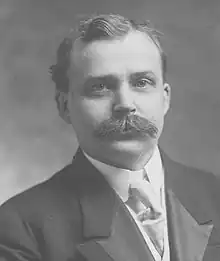Darwin D. Martin
Darwin Denice Martin (1865–1935) was an early 20th-century New York State businessman best known for the house he commissioned from Frank Lloyd Wright.
Darwin D. Martin | |
|---|---|
 | |
| Born | Darwin Denice Martin October 25, 1865 |
| Died | December 17, 1935 (aged 70) |
| Resting place | Forest Lawn Cemetery, Buffalo |
| Occupation | Corporate Secretary of the Larkin Company |
| Spouse |
Isabelle Reidpath (m. 1889) |
| Children | 2 |
| Relatives | George F. Barton (brother-in-law) |
Early life
Darwin Martin was born on October 25, 1865, in Bouckville, New York, an upstate New York community.[1] His siblings included Louis Franklin ("Frank") Martin, William Martin, Delta Martin (who married George F. Barton), and Maude Martin Huffer. Martin had a difficult childhood, starting with the death of his mother when he was six. Martin's family was separated, and Martin, who was the youngest of five, was forced to part ways with all his siblings except for his brother Frank.
Larkin Company
The two Martin brothers went to New York City and Darwin obtained a job selling soap. Martin then came by himself to Buffalo to work in the Larkin Company as the first, and at that time the only, hired office-worker of the Larkin Company, as all office work was done by Larkin himself. One of the figures in the company who Martin admired was Elbert Hubbard, an executive. Martin worked ferociously, putting in 361 workdays a year. His efforts enabled the company to expand and rival Sears and Roebuck Co. He is credited with converting all the company customer records from cumbersome ledgers to efficient card catalogs, a pioneering advance in business record-keeping at the time.[2] In 1890, Darwin D. Martin replaced Hubbard as corporate secretary of Larkin Company. One of his assignments was to find an architect to design a new administrative building for the expanding company. His brother, William Martin, who was living in Chicago, recommended a young architect named Frank Lloyd Wright.
While at Larkin, Martin created a unique card ledger system for tracking sales and maintaining accounts which is utilized by many corporations, in various formats, to this day. Martin retired from the Larkin Company in 1925, and in 1929, construction began on Graycliff.[3]
Friendship with Wright
Martin and Wright formed a lifelong friendship due to their similar outlooks on family. Although John D. Larkin, the company president, was unimpressed by Wright, Martin convinced Larkin to give Wright the job. By this time Martin had built a considerable fortune and asked Wright to design a house for him as well. This project would become the historic Darwin D. Martin House. Wright had complete freedom and an almost unlimited budget to execute it.
Isabelle Reidpath Martin, Darwin's wife, was unhappy with the house due to the limited light it received, as she was nearly blind. Darwin and Isabelle and their two children, however, would live there for over 20 years. During this time Martin's fortune continued to rise, while Wright, with whom he kept in constant contact, fell on troubled times. Martin began to lend Wright money, becoming the largest benefactor behind Wright's Taliesin. At one point Wright solicited Martin to become his business partner. Martin declined, having just retired from the Larkin Company. During a fallow period in Wright's career, Martin commissioned him to design a summer home, Graycliff, stressing that this house was to conform to Isabel's desires. The result was one of Wright's most important mid-career designs, taking extensive advantage of Graycliff's location on a bluff overlooking Lake Erie. The largest of the three buildings at Graycliff, the Isabelle R. Martin House, is transparent, allowing views of the lake through the house. Terraces and cantilevered balconies enhance the organic nature of the buildings.
Downfall and death
Martin was a millionaire when the great stock market crash occurred. Overnight, he lost almost everything.[4] When Wright's autobiography came out, Martin was so impoverished he could not afford to buy a $6.00 copy. In a letter Wright said that of the mere six copies he was receiving, Darwin Martin would receive one if no one else. The money that Martin had lent Wright, over seventy thousand dollars, was never repaid.[5]
After a series of strokes, Darwin Martin died in 1935 at the age of 70. He is buried in Forest Lawn Cemetery. Wright designed his only cemetery monument, the "Blue Sky Mausoleum," at Darwin Martin's request, but because of the family's declining fortunes, it was not built until 2004, when Forest Lawn administrators erected the Blue Sky monument in honor of Martin and Wright.[6]
Some of Martin's papers survive in the collection of the Buffalo History Museum.[7]
Personal life
In 1889, Martin married Isabelle Reidpath (1869–1945) and remained married to her until his death in 1935. Martin and Isabelle had two children.[8]
Martin died of a stroke in 1935 at age 70. Isabelle died in Buffalo in 1945.[8]
See also
References
- The Martin Family Fact Sheet, pg. 1.
- Martin, D.D. The first to make a card ledger: story of the Larkin card indexes. Buffalo, NY: Larkin, 1932
- "Chronology: Martin Family – Frank Lloyd Wright, 1865–1959". buffalo.edu. University of New York at Buffalo. Retrieved September 1, 2015.
- "HIGH COURT DENIES ALUMINUM APPEAL Way Paved for Court Test of Price-Fixing Charge Made by Bay State Company. LAKE DIVERSION CASE BACK Illinois Attacks Report of the Special Master — Stock Sale Tax Ruling Affirmed". The New York Times. April 18, 1933. Retrieved September 15, 2016.
- "WNED ([[NPR]]), "Frank Lloyd Wright's Buffalo"". Archived from the original on April 16, 2013. Retrieved September 19, 2008.
- The Blue Sky Mausoleum. http://www.blueskymausoleum.com/Pages/story01.html Archived November 21, 2008, at the Wayback Machine, accessed December 23, 2008.
- "Darwin D. Martin Papers and Larkin Company Inc. Records, 1857–1960". Retrieved July 6, 2013.
- "Darwin D. Martin Photograph Collection | New York Heritage". www.nyheritage.org. University at Buffalo, University Archives. Retrieved September 15, 2016.



